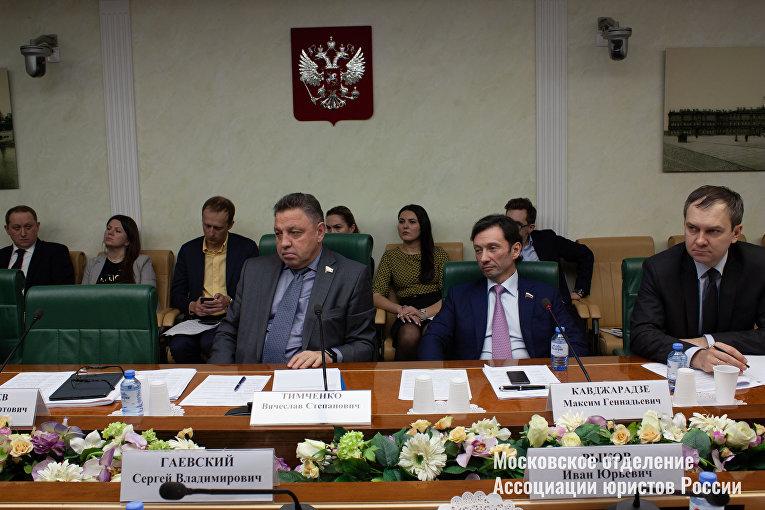A working group on drafting legislative proposals facilitating the establishment of a Business Recovery Center has held its first meeting in the framework of an initiative launched by member of the Federation Council, the upper house of Russia’s Parliament, Maxim Kavdzharadze in 2019.
The discussion has focused, among other topics, on the development and implementation of mechanisms to settle crisis situations at industrial enterprises of systemic significance. As it has been noted during the event, the instruments sought are aimed at saving businesses and preclusion of bankruptcies of such enterprises. The participants of the meeting have presented their respective specific proposals.
Chair of the Federation Council’s Rules and Organization of Parliamentary Activities Committee Vyacheslav Timchenko has acted as a moderator of the meeting, whereas Deputy Chair of the Council’s Committee on Constitutional Legislation and State Building Kavdzharadze has initiated the discussion. Representatives of the Federal Antimonopoly Service (FAS), Chamber of Commerce and Industry, Federal Bailiffs Service, Business Ombudsman, State Corporation Rostec, as well as persons representing regional authorities, legal experts and practitioners, have taken part in the meeting.
The participants have discussed issues relevant to the need to develop and implement crisis settlement mechanisms at Russia’s enterprises aimed to save these enterprises and prevent their bankruptcies; they have also presented their proposals as to changing or streamlining the current legislation.
Members of the working group on anti-crisis regulation of socially important businesses at the Moscow office of the Association of Russian Lawyers have made a specific proposal. Their project envisages, on the one hand, determination of the procedure and format of involvement of state bodies in the settlement of crisis situations. On the other hand, it stipulates a mechanism of protection of the rights of employees of enterprises, for instance, in the form of a federal foundation, which could ensure repayment of wage arrears accumulated by bankrupted enterprises at the expense of the sums received as pay for queue positions in the line of those waiting for such repayment.
According to the Chair of the Executive Committee of the Moscow Office of the Association of Russian Lawyers Dmitry Kravchenko, in the context of development of a modern enterprise recovery mechanism it is necessary to prioritize the issue of prevention of bankruptcies of enterprises of systemic importance. At the same time, a public service aimed to bring together companies and the bodies undertaking the recovery thereof established specifically in the interests of small and medium-sized businesses might be seen as a respective viable instrument, which could be introduced even in the absence of a specific law and formation of a public not-for-profit organization.
Ways of finding solutions and instruments aimed at lowering risks in the course of business operations are actively discussed this year. In January, for instance, there was raised the issue of decriminalization of certain Criminal Code provisions concerning economic crimes most often incriminated to entrepreneurs. This topic was discussed at legal expert conferences, across federal mass media outlets, by state bodies. There was announced the establishment of an expert center for anti-crisis regulation and restructuring of distressed assets on the basis of Plekhanov Russian University of Economics and a Rostec structure.
In mid-February 2020, a working group of the State Council chaired by Tula Region Governor Aleksey Dyumin drafted proposals aimed to partially decriminalize legislation on economic crimes. One of the most imaginative initiatives was the proposal to abolish Article 145.1 of the Russian Criminal Code (failure to pay wages and salaries), which envisaged imprisonment for up to 5 years, replacing it with a punishment by commensurable fines. Similar approaches were proposed with respect to a number of other provisions on economic crimes.
In a whole range of high-profile criminal cases there were brought charges based on the so-called “economic” articles of the Criminal Code, whereas the motives behind the defendants’ actions and crisis situations at enterprises were not taken into account as significant arguments because of the respective position of the judiciary. The graphical examples are the case over extortion of the controlling interest in Inskoy mine where businessman Alexander Shchukin, two ex-deputy governors of the Kemerovo Region, and a retired Investigative Committee General are among the defendants; the case of the Volsky poultry farm where its ex-owner Alexander Ivanov is charged with embezzlement of over 4 billion rubles (about $60.3 million) borrowed from Sberbank and a 600 million-ruble (over $9 million) VAT return fraud; the case against AO T-Platform CEO Vsevolod Opanasenko charged with a state contract related fraud; the case against OOO AVA Company CEO Armen Babadzhanyan charged with a profit-motivated failure to pay wages to workers of an enterprise went bankrupt because of a technical accident.



